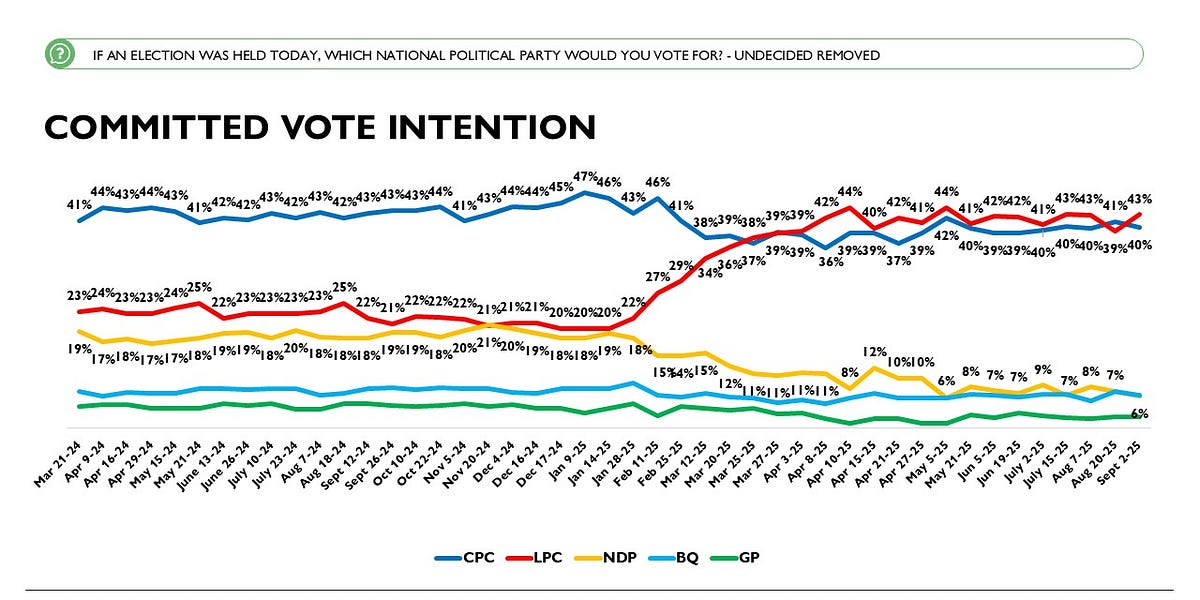Over the Labour Day weekend from August 28 to September 2, Abacus Data conducted a survey of 1,500 Canadian adults, following reports that the national economy had contracted for the first time in nearly two years. The findings reveal a quiet but notable shift in public sentiment.\n\nApproximately 35% of respondents believe the country is moving in the right direction, while 48% feel it is on the wrong path—a figure that has remained stable in recent weeks. Despite no sharp drop in confidence, there is also no sign of improvement. Views on global affairs remain particularly pessimistic, with only 13% expressing optimism about world conditions and 14% about the United States.\n\nEconomic affordability continues to dominate public concern, cited by 61% as one of their top three issues. However, broader economic conditions are gaining attention, now prioritized by 39% of respondents—up from 36% two weeks prior. This shift nearly matches the 38% who identify the Trump administration as a top concern, suggesting that trade-related economic pressures are increasingly influencing both macro and personal financial outlooks. Healthcare and housing follow as key issues, mentioned by 33% and 30% respectively.\n\nThe approval rating for the Carney administration has dipped slightly to 48%, down one point, while disapproval has climbed to 30%. Though not yet a crisis, the trend indicates a gradual loss of political momentum.\n\nCarney’s personal approval has also softened, with 48% viewing him favorably and 35% unfavorably. His net approval rating has declined from +21 in mid-July to +13, reflecting a steady erosion across various regions and demographic groups.\n\nIn terms of voting intentions among decided voters, the Liberal Party leads with 43%, a four-point increase, while Conservative support has fallen to 40%. Smaller parties trail behind: NDP at 6%, Bloc Québécois at 7%, Greens at 2%, and PPC at 1%. The Liberals maintain strong support in Ontario and Quebec, whereas the Conservatives are more popular in British Columbia and the Prairie provinces.\n\nWhen it comes to issue leadership, the political divide is clear. The Conservatives hold an edge on cost of living (38% vs. 29%) and economic management (43% vs. 36%), as well as immigration. Meanwhile, the Liberals are seen as more competent on climate change (33% vs. 12%), healthcare (33% vs. 24%), and managing relations with the U.S. (55% vs. 23%). This reflects a nation divided not only by party preference but also by differing priorities and perceptions on key policy areas.\n\nThe data suggests that the summer’s political calm may be ending. Beneath a surface of stability, economic unease is growing, government support is weakening, and voter sentiment appears to be in transition. With a shrinking GDP and the return of Parliament, the coming months could bring more pronounced changes in public opinion and political dynamics.\n\n— news from inFocus with David Coletto\n\n— News Original —\nEconomic Anxiety Rises, Carney Government Approval Falls\nOver the Labour Day long weekend (August 28 – September 2), Abacus Data surveyed 1,500 Canadian adults following news that Canada’s economy contracted for the first time in nearly two years. The result? A subtle but meaningful shift in public mood. \n\nHere’s what stands out: \n\n1. The Country’s Headline Mood: Steady, Not Sunny \n\nJust over 1 in 3 Canadians believe things are headed in the right direction, while 48% think the country is on the wrong track, virtually unchanged for weeks. But if confidence isn’t falling, it isn’t rising either. Meanwhile, perceptions of international affairs, of the world (13%) and the U.S. (14%), remain particularly bleak. \n\n2. The Economy Creeps Back Up the Agenda \n\nAffordability remains the dominant worry, 61% cite it among their top three concerns. But attention to the broader economy is ticking up, with 39% ranking it as a top priority (up from 36% just two weeks earlier). That nearly matches the share naming “Trump and his administration”, a telling indicator that economic anxiety is becoming more front-of-mind as the trade conflict impacts macro-economic and micro-economic perceptions. Healthcare (33%) and housing (30%) complete the top four concerns. \n\n3. Government Approval Inches Lower \n\nApproval for the Carney government now rests at 48%, down a point, with disapproval rising to 30%. Not yet alarm bells, but a quiet decline in momentum nonetheless. \n\n4. Carney’s Personal Numbers Slip \n\nCarney remains net-positive, with 48% favourable vs. 35% unfavourable, but his net rating has dropped from +21 in mid-July to +13 now. A slow but widespread erosion, especially notable across regions and demographic groups. \n\n5. Vote Intentions: Liberals Edge Ahead Back to Election Result Levels \n\nAmong decided voters, the Liberals lead at 43%, up four points, while the Conservatives’ support falls to 40%. Other parties trail: NDP (6%), Bloc (7%), Greens (2%), PPC (1%). The Liberals hold strength in Ontario and Quebec; Conservatives, in B.C. and the Prairies. \n\n6. Issue Ownership Reflects a Split Reality \n\nOn the cost of living, Conservatives lead 38% to 29%. On the economy, they hold a 43% to 36% advantage. Immigration, too, is a major Conservative edge (hence this). But Liberals maintain authority on climate change (33% vs. Conservatives’ 12%), healthcare (33% vs. 24%), and U.S.–Canada relations (55% vs. 23%). We’re seeing a country split not just along partisan lines, but across issue perceptions and priorities. \n\nWhat It All Means \n\nThe summer lull may be over. Beneath surface stability, public anxiety about the economy is rising, support for Carney is softening, and political direction is in flux. With GDP contracting and Parliament returning, this fall may bring sharper shifts in public opinion and political momentum. \n\nCurious for the full breakdown, you can get the full details below. \n\nRead the full poll report: https://abacusdata.ca/abacus-data-poll-carneys-liberals-regain-lead-as-economy-woes-grow/
